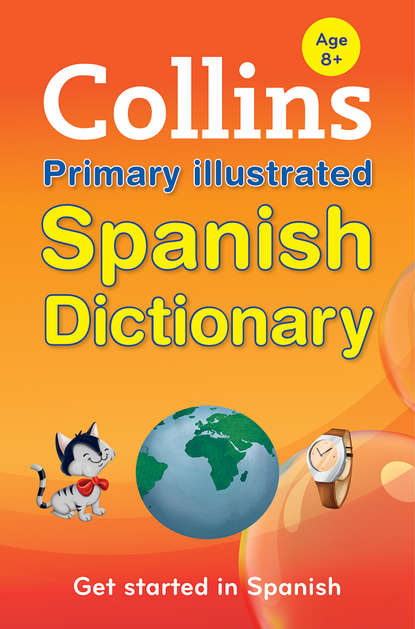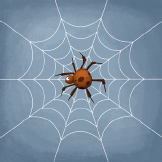
Полная версия:
Collins Primary Dictionaries
alcanzar VERB
1 to catch up with La alcancé cuando salía por la puerta. I caught up with her just as she was going out of the door.
2 to reach alcanzar la cima de la montaña to reach the top of the mountain
3 to pass ¿Me alcanzas las tijeras? Could you pass me the scissors?
alegrar VERB
to cheer up Intenté alegrarlos con unos chistes. I tried to cheer them up with a few jokes. Me alegra que hayas venido. I’m glad you’ve come.
■ alegrarse to be glad ¿Te gusta? Me alegro. You like it? I’m glad. Me alegro de su éxito. I’m glad about his success. alegrarse por alguien to be happy for somebody Me alegro por ti. I’m happy for you.
alegre (FEM alegre) ADJECTIVE
cheerful
la alegría NOUN
Sentí una gran alegría. I was really happy.
¡Qué alegría! How lovely!
alejarse VERB
to move away Aléjate un poco del fuego. Move a bit further away from the fire.
la alergia NOUN
allergy ¿Tienes alguna alergia? Have you got any allergies? alergia al polen hay fever
las aletas PL NOUN
flippers
la alfombra NOUN
1 rug
2 carpet

algo
algo can be a pronoun or an adverb.
A PRONOUN
1 something Algo se está quemando. Something is burning. ¿Quieres algo de comer? Would you like something to eat? ¿Te pasa algo? Is something the matter? Aún queda algo de zumo. There’s still some juice left.
2 anything ¿Algo más? Anything else?
B ADVERB
rather La falda te está algo corta. The skirt’s rather short on you.
el algodón (PL los algodones) NOUN
cotton Me puse algodones en los oídos. I put cotton wool in my ears. el algodón de azúcar candyfloss
alguien PRONOUN
1 somebody Alguien llama a la puerta. There’s somebody knocking at the door. ¿Necesitas que te ayude alguien? Do you need somebody to help you?
2 anybody ¿Conoces a alguien aquí? Do you know anybody here?
algún ADJECTIVE (FEM alguna, MASC PL algunos)
1 some Algún día iré. I’ll go there some day.
2 any ¿Compraste algún cuadro? Did you buy any pictures? ¿Quieres alguna cosa más? Was there anything else?
algún que otro … the odd …
alguno PRONOUN (FEM alguna)
1 somebody Siempre hay alguno que se queja. There’s always somebody who complains. Algunos piensan que no ocurrió así. Some people think that’s not what happened.
2 some Solo conozco a algunos de los vecinos. I only know some of the neighbours. Tiene que estar en alguna de estas cajas. It must be in one of these boxes.
3 any Necesito una aspirina. ¿Te queda alguna? I need an aspirin. Have you got any left? Si alguno quiere irse que se vaya. If any of them want to leave, fine. ¿Lo sabe alguno de vosotros? Do any of you know?
el alimento NOUN
food alimentos congelados frozen food
allá ADVERB
over there Tu libro está allá. Your book is over there. Échate un poco más allá. Move over that way a bit.
allí ADVERB
there Allí está. There it is. Allí viene tu hermana. Here comes your sister.
el alma FEM NOUN
soul Lo siento en el alma. I’m really sorry.
la almohada NOUN
pillow
almorzar VERB
to have lunch No he almorzado todavía. I haven’t had lunch yet. ¿Qué has almorzado? What did you have for lunch?
el almuerzo NOUN
lunch
alrededor ADVERB
alrededor de around/about
Language tip
alrededor de has two meanings. Look at the examples.
El satélite gira alrededor de la Tierra. The satellite goes around the Earth. Deben de ser alrededor de las dos. It must be about two o’clock.
los alrededores PL NOUN
Ocurrió en los alrededores de Madrid. It happened near Madrid. Hay muchas tiendas en los alrededores del museo. There are a lot of shops in the area around the museum.
alto (FEM alta)
alto can be an adjective, a pronoun or an exclamation.
A ADJECTIVE
1 tall Es un chico muy alto. He’s a very tall boy. un edificio muy alto a very tall building
2 high

El Everest es la montaña más alta del mundo. Everest is the highest mountain in the world. Sacó notas altas en todos los exámenes. He got high marks in all his exams.
3 loud La música está demasiado alta. The music’s too loud.
B ADVERB
high subir muy alto to go up very high Pepe habla muy alto. Pepe has got a very loud voice. ¡Más alto, por favor! Speak up, please! Pon el volumen más alto. Turn the volume up.
C EXCLAMATION
stop!
la altura NOUN
height Volamos a una altura de quince mil pies. We’re flying at a height of fifteen thousand feet. La pared tiene dos metros de altura. The wall’s two metres high.
el alumno la alumna NOUN
pupil
amable (FEM amable) ADJECTIVE
kind
amanecer
amanecer can be a verb or a noun.
A VERB
to get light Amanece a las siete. It gets light at seven.
B MASC NOUN
dawn
al amanecer at dawn
amar VERB
to love
amargo (FEM amarga) ADJECTIVE
bitter
amarillo (FEM amarilla) ADJECTIVE, MASC NOUN
yellow
el ambiente NOUN
atmosphere Se respira un ambiente tenso. There’s a tense atmosphere. el medio ambiente the environment
amenace VERB ▷see amenazar No voy a hacerlo aunque me amenace. I’m not going to do it even if he threatens me.
la amenaza NOUN
threat
amenazar VERB
to threaten Le amenazó con decírselo al profesor. He threatened to tell the teacher.
el amigo la amiga NOUN
friend
hacerse amigos to become friends
el amor NOUN
love

ancho (FEM ancha) ADJECTIVE
1 wide una calle ancha a wide street
2 loose Le gusta llevar ropa ancha. He likes to wear loose clothing. Me está ancho el vestido. The dress is too big for me.
anda EXCLAMATION
1 well I never! ¡Anda, un billete de cincuenta euros! Well I never, a fifty-euro note!
2 come on ¡Anda, ponte el abrigo y vámonos! Come on, put your coat on and let’s go!
¡Anda ya! You’re not serious!
andar VERB
1 to walk Anduvimos varios kilómetros. We walked several kilometres. Iremos andando a la estación. We’ll walk to the station.
2 to be Últimamente ando muy liado. I’ve been very busy lately. No sé por dónde anda. I don’t know where he is. ¿Qué tal andas? How are you? andar mal de dinero to be short of money
anduve VERB ▷see andar Anduve dos horas. I walked for two hours
el ángel NOUN
angel
el ángulo NOUN
angle en ángulo recto at right angles
el anillo NOUN
ring un anillo de boda a wedding ring
animado (FEM animada) ADJECTIVE
1 cheerful Últimamente parece que está más animada. She has seemed more cheerful lately.
2 lively Fue una fiesta muy animada. It was a very lively party. dibujos animados cartoons
el animal NOUN
animal los animales domésticos pets

animar VERB
1 to cheer up Lo ha pasado muy mal y necesita que la animen. She has had a rough time and needs cheering up.
2 to cheer on Estuvimos animando al equipo. We were cheering the team on. animar a alguien a que haga algo to encourage somebody to do something Nos animaron a que fuésemos a la fiesta. They encouraged us to go to the party.
■ animarse to cheer up ¡Vamos, anímate hombre! Come on, cheer up mate! animarse a hacer algo to make up one’s mind to do something
ánimo EXCLAMATION
cheer up! ¡Ánimo, chaval, que no es el fin del mundo! Cheer up mate, it’s not the end of the world!
anoche ADVERB
last night antes de anoche the night before last
anochecer VERB
to get dark En invierno anochece muy temprano. It gets dark very early in winter.
anteayer ADVERB
the day before yesterday
la antena NOUN
aerial una antena parabólica a satellite dish
anterior (FEM anterior) ADJECTIVE
before La semana anterior llovió mucho. It rained a lot the week before. Su examen fue anterior al nuestro. Their exam was before ours.
antes ADVERB
1 before Esta película ya la he visto antes. I’ve seen this film before. antes de la cena before dinner antes de que te vayas before you go Él estaba aquí antes que yo. He was here before me. Antes no había tantos juguetes. People didn’t use to have so many toys.
2 first Nosotros llegamos antes. We arrived first.
lo antes posible as soon as possible
antiguo (FEM antigua) ADJECTIVE
old Este reloj es muy antiguo. This clock is very old.
antipático (FEM antipática) ADJECTIVE
unfriendly
anual (FEM anual) ADJECTIVE
annual
anunciar VERB
to announce anunciar una decisión to announce a decision
el anuncio NOUN
1 advertisement Pusieron un anuncio en el periódico. They put an advertisement in the paper.
2 announcement Tengo que hacer un anuncio importante. I have an important announcement to make.
añadir VERB
to add
el año NOUN
year Estuve allí el año pasado. I was there last year. ¿Cuántos años tiene? How old is he? Tiene siete años. He’s seven.

¡Feliz Año Nuevo! Happy New Year! el año que viene next year el año pasado last year los años ochenta the eighties
apagar VERB
to switch off Apaga la tele. Switch the TV off.
aparecer VERB
1 to appear De repente apareció la policía. The police suddenly appeared.
2 to turn up ¿Han aparecido ya las tijeras? Have the scissors turned up yet?
el apartamento NOUN
flat
apartar VERB
to move out of the way Aparta todas las sillas. Move all the chairs out of the way. ¡Aparta! Stand back!
■ apartarse to stand back Apártense de la puerta. Stand back from the door.
el apellido NOUN
surname
apenas ADVERB, CONJUNCTION
1 hardly No tenemos apenas nada de comer. We’ve got hardly anything to eat. Apenas podía levantarse. He could hardly stand up.
2 hardly ever Apenas voy al cine. I hardly ever go to the cinema.
3 barely Hace apenas diez minutos que hablé con ella. I spoke to her barely ten minutes ago. Terminé en apenas dos horas. It only took me two hours to finish.
el aperitivo NOUN
aperitif
apestar VERB
to stink Te apestan los pies. Your feet stink. apestar a to stink of
apetecer VERB
¿Te apetece una tortilla? Do you fancy an omelette? No, gracias, ahora no me apetece. No, thanks, I don’t feel like it just now.
el apetito NOUN
appetite Eso te va a quitar el apetito. You won’t have any appetite left. No tengo apetito. I’m not hungry.
aplastar VERB
to squash Me senté encima del regalo y lo aplasté. I sat on the present and squashed it.
aplaudir VERB
to clap Todos aplaudían. Everyone clapped.
el aplauso NOUN
applause Los aplausos duraron varios minutos. The applause lasted for several minutes.
aplazar VERB
to postpone
apostar VERB
to bet apostar por algo to bet on something ¿Qué te apuestas a que … ? How much do you bet that…?
apoyar VERB
1 to lean Apoya el espejo contra la pared. Lean the mirror against the wall.
2 to rest Apoya la espalda en este cojín. Rest your back against this cushion.
3 to support Todos mis compañeros me apoyan. All my colleagues support me.
■ apoyarse to lean No te apoyes en la mesa. Don’t lean on the table.
aprender VERB
to learn Ya me he aprendido los verbos irregulares. I’ve already learnt the irregular verbs. aprender a hacer algo to learn to do something Estoy aprendiendo a tocar la guitarra. I’m learning to play the guitar.
aprender algo de memoria to learn something off by heart
apretado (FEM apretada) ADJECTIVE
1 tight Estos pantalones me están muy apretados. These trousers are very tight on me.
2 cramped Íbamos muy apretados en el autobús. We were very cramped on the bus.
apretar VERB
1 to tighten Aprieta bien los tornillos. Tighten up the screws.
2 to press Aprieta este botón. Press this button. Me aprietan los zapatos. My shoes are too tight.
aprobar VERB
to pass aprobar un examen to pass an exam aprobar por los pelos to scrape through
aprovechar VERB
1 to make good use of No aprovecha el tiempo. He doesn’t make good use of his time.
2 to use Aprovecharé los ratos libres para estudiar. I’ll use my spare time to study. aprovecharse de to take advantage of Me aproveché de la situación. I took advantage of the situation. Todos se aprovechan del pobre chico. Everyone takes advantage of the poor boy.
¡Que aproveche! Enjoy your meal!
apruebo VERB ▷see aprobar Si no apruebo, mis padres se enfadarán. If I fail, my parents will be angry.
apuesto VERB ▷see apostar Te apuesto a que no le va a gustar. I bet you she won’t like it.
apuntar VERB
1 to write down Apúntalo o se te olvidará. Write it down or you’ll forget. Apunta mis datos. Can you take a note of my details?
2 to point Me apuntó con el dedo. He pointed at me.
■ apuntarse to put one’s name down Nos hemos apuntado para el viaje a Marruecos. We’ve put our names down for the trip to Morocco. apuntarse a un curso to enrol on a course
¡Yo me apunto! Count me in!
los apuntes NOUN
notes
tomar apuntes to take notes
aquel (FEM aquella) ADJECTIVE
that Me gusta más aquella mesa. I prefer that table.
aquél (FEM aquélla) PRONOUN
that one Aquél no es el mío. That one isn’t mine. Dame aquélla de allí. Give me that one over there.
aquello PRONOUN
aquello que hay allí that thing over there
aquí ADVERB
1 here Aquí está el informe que me pediste. Here’s the report you asked me for.
2 now de aquí en adelante from now on por aquí around here/this way
Language tip
por aquí has two meanings. Look at the examples.
Lo tenía por aquí en alguna parte. I had it around here somewhere. Pasa por aquí, por favor. Please come this way.
la araña NOUN
spider

¡Hay una araña en la bañera! There’s a spider in the bath!
arañar VERB
to scratch El gato me arañó. The cat scratched me.
el árbitro la árbitra NOUN
referee
el árbol NOUN
tree

un árbol frutal a fruit tree el árbol de Navidad the Christmas tree



